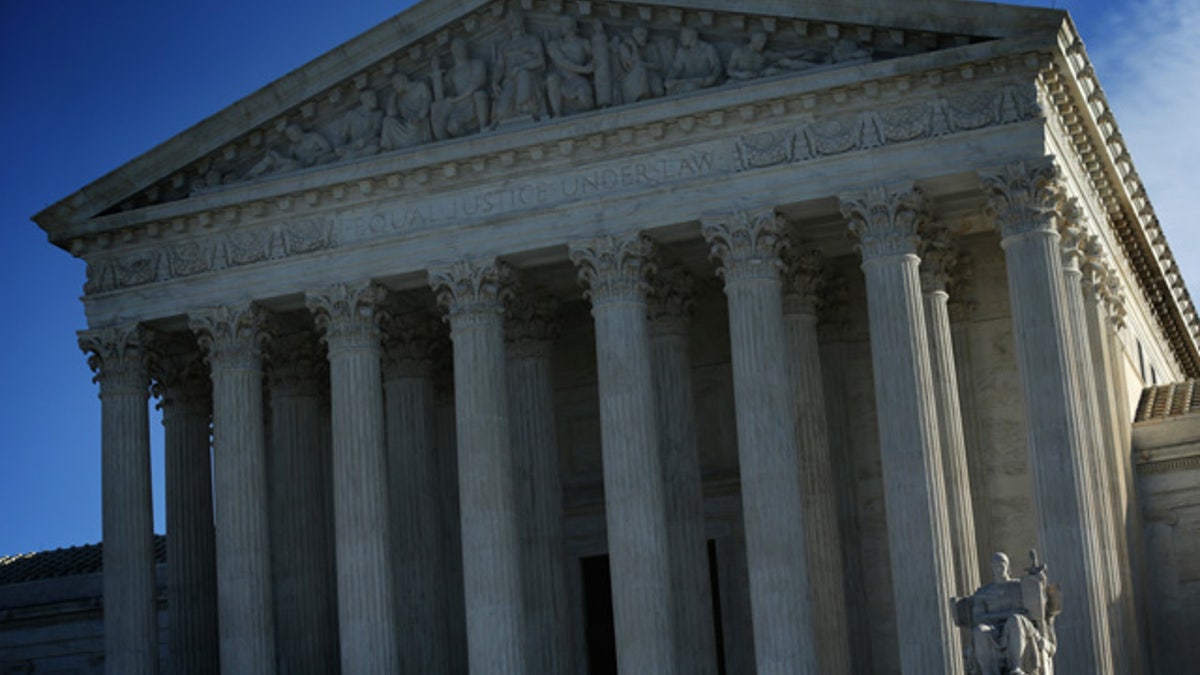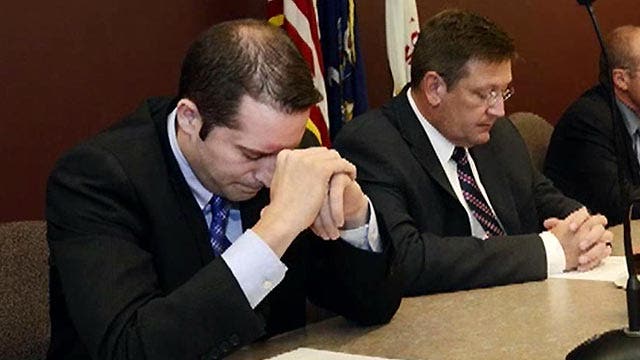Public prayer at center of landmark Supreme Court case
Town's council meeting tradition challenged in New York State
A federal appeals court ruled Friday that a North Carolina county’s practice of opening commissioners’ meetings with Christian prayers – and inviting the audience to join in – is unconstitutional.
The 45-page opinion by the 4th Circuit U.S. Court of Appeals in Richmond, Va. sets up a possible showdown on the issue at the U.S. Supreme Court in coming months.
The appeals court ruled 10-5 in favor of the American Civil Liberties Union of North Carolina, which filed the lawsuit on behalf of non-Christian residents who claimed they felt excluded by the prayer.
“This ruling is a great victory for the rights of all residents to participate in their local government without fearing discrimination or being forced to join in prayers that go against their beliefs,” Chris Brook, ACLU of North Carolina Legal Director, said in a statement. “We are very pleased that the full Fourth Circuit has upheld a bedrock principle of the First Amendment: that government should not be in the business of promoting one set of religious beliefs over others.”
The Supreme Court has already ruled that it’s appropriate in limited circumstance for local clergy to deliver predominantly Christian prayers and town meetings.
But in the Rowan County, North Carolina case, the prayers were given by elected-commissioners themselves. The court also weighed in on whether their invitation for the audience to join them in prayer was a coercive act.
"The prayer practice served to identify the government with Christianity and risked conveying to citizens of minority faiths a message of exclusion," Judge J. Harvie Wilkinson wrote in the majority opinion that was joined by nine other judges.
Judge Paul Niemeyer wrote in a dissent that the majority opinion "actively undermines the appropriate role of prayer in American civil life."
"In finding Rowan County's prayer practice unconstitutional, essentially because the prayers were sectarian, the majority's opinion strikes at the very trunk of religion, seeking to outlaw most prayer given in government assemblies, even though such prayer has been an important part of the fabric of our democracy and civic life," he wrote. Four other judges also dissented including Judge Steven Agee.
“There is no indication of discrimination in this record. None,” he wrote. “Nor is there any suggestion that the Board has or would bar any commissioner from offering a prayer faithful to the commissioner’s own traditions, regardless of his or her faith.”
"There is no indication of discrimination in this record. None."
The full 4th Circuit heard the case in March after a divided three-judge panel earlier said Rowan County commissioners had a constitutional right to open meetings with prayers as long as they don't pressure observers to participate.
The ACLU filed the lawsuit on behalf of non-Christians who say the prayers made them feel excluded and sent the message that the board favored a particular religion. The ACLU noted that Rowan County commissioners directed the public to participate, with phrases such as "please pray with me," and used language that could be seen as proselytizing, like "I pray that the citizens of Rowan County will love you, Lord."
Attorneys for Rowan County argued that commissioners don't force anyone to participate, noting that people can leave the room or stay seated during the prayer. Since the district court's decision deeming the prayers unconstitutional, the commission has invited a volunteer chaplain to lead prayer.
In 2014, the Supreme Court gave limited approval to public prayers at an upstate New York town's board meetings, citing the country's history of religious acknowledgment in the legislature.
The 5-4 ruling came in yet another contentious case over the intersection of faith and the civic arena. It was confined to the specific circumstances and at the time offered few bright-line rules on how other communities should offer civic prayers without violating the Constitution.

WASHINGTON, DC - JANUARY 09: An exterior view of the U.S. Supreme Court January 9, 2015 in Washington, DC. The justices of the Supreme Court were scheduled to meet to determine whether the court will take up any of the five pending state-banned same-sex marriage cases in Ohio, Tennessee, Michigan, Kentucky and Louisiana.> on January 9, 2015 in Washington, DC. (Photo by Alex Wong/Getty Images) (Getty Images)
Two local women sued officials in Greece, New York, objecting to invocations at monthly public sessions on government property. The invocations, according to the plaintiffs, have been overwhelmingly Christian in nature over the years.
"The town of Greece does not violate the First Amendment by opening its meetings with prayer that comports with our tradition," Justice Anthony Kennedy said, "and does not coerce participation by nonadherents."
The Supreme Court traditionally begins its public session as it has for decades: with the marshal invoking a traditional statement that ends, "God save the United States and this honorable court."
The conservative majority offered varying interpretations of when such "ceremonial" prayers would be permissible. Kennedy, along with Chief Justice John Roberts and Justice Samuel Alito, focused on the specifics of the Greece case and did not offer a broad expansion of legislative prayer.
Friday’s ruling is Lund v. Rowan County (15-1591).
The Associated Press contributed to this report.












































